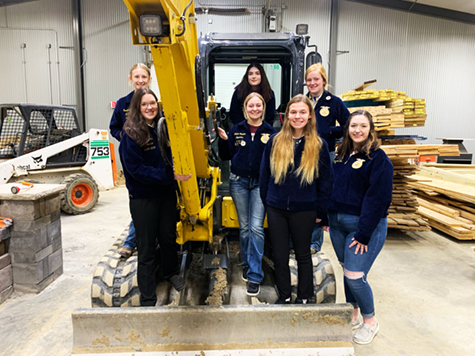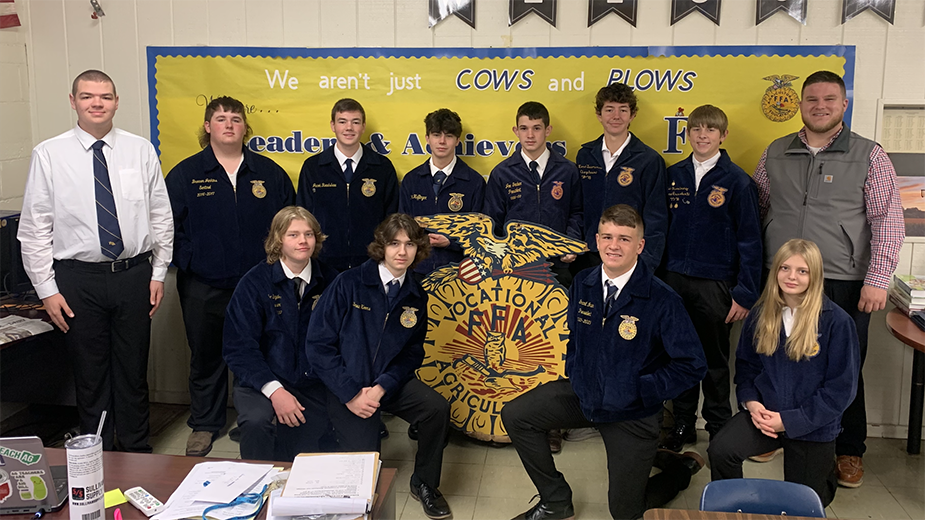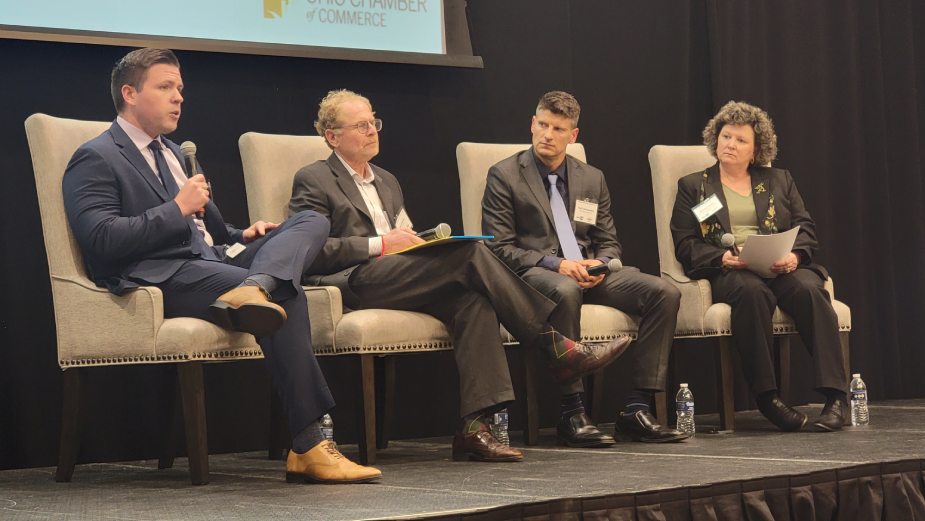Future Farmers: More Than Cows, Plows
HANOVERTON, Ohio – A whiteboard in the agriscience classroom of United Local High School carries a simple but weighty message, proudly displayed in FFA’s official colors of national blue and corn gold: “We aren’t just cows and plows; we are leaders and achievers.”
The chapter adviser and the school’s agriscience teacher, Tyler Gentry, says he emphasizes that while his lessons are based in agriculture, they go far beyond the farm.
“I think that the reputation is that FFA (nee Future Farmers of America) is only agriculture and that is the impression that most of the student body has as far as what I teach,” Gentry says. “The things that I teach are about life outside of agriculture – and they’re things that they’re able to use, even if they’re not going back to the farm.”
Changing the narrative around the FFA has been ongoing since 1988 when it changed its name from the Future Farmers of America to the National FFA Organization to reflect the growing diversity in agriculture. The change came 60 years after the founding of the Future Farmers.
Workforce Development
The FFA is a workforce development giant. Members participate and learn advanced career skills in 47 national proficiency areas based on hands-on work experiences that range from agricultural communications and food science and technology to turf grass management and wildlife production and management, according to the National FFA.
The organization has 25 nationally recognized career development events, or CDEs, that cover jobs skills for more than 300 careers, according to the National FFA. Members also participate in leadership development events, or LDEs, that cultivate leadership skills, such as public speaking and parliamentary procedure.
Creating job-ready members of society is one aspect of the FFA goal, Southern Local High School adviser and agriscience teacher Shelley Pirogowicz says.
“Our goal by the time they graduate is that they have at least a couple hundred hours of work-based learning. And so, they are working somewhere, getting skills that they’re going to take to whatever type of career they go into, whether it’s ag related or not,” she says.
Agriculture education emphasizes work-based learning through supervised agricultural experiences, or SAEs. SAEs are part of the three-component model of agriculture education: classroom/laboratory learning, SAE and FFA.
SAEs allow students to apply what they learn in the classroom in a real-world setting, according to the National FFA website. An SAE is an experiential service and/or work-based project supervised by their adviser. Students are encouraged to choose an annual project that reflects a passion or career interest and ranges from a part-time job to raising farm animals for the county fair, while effecting a research aspect to it.
Mara Benner, a Columbiana County Career Center FFA member, is using her job at Harbor Pet Center in Boardman as her SAE. For the research aspect, she’ll be researching puppy mills and underground dog breeding operations and educating her fellow members about her findings.
Some students choose to keep an animal as a project, such as CCCTC FFA members Willow Weston, who is using her pygmy goats as her project, and Rachel Steele who is raising a hedgehog.
CCCTC enrolls all students in one of three programs: FFA, Skills USA or Business Professionals of America. In its handbook, the district states that “these student organizations are an integral part of every career and technical program.” All students are automatically members of their respective organizations, such as the veterinary science students belonging to FFA.
While the school recognizes the importance of FFA inside of the classroom, the administration is still under the impression that it’s simply a youth organization that meets a few times a month, CCCTC adviser Jamie Stacy says.
“We’re trying to get them to really understand the value outside of the classroom that they can offer if they will continue to support us and allow us to do these functions,” she says. “It’s an everyday struggle just trying to keep up and make sure that we politic as much as we can to let people know what we do.”
All 17 local FFA members The Business Journal spoke to share the same sentiment: They believe the FFA has prepared them for the workforce. For some, it showed what they want to do after graduation.
Small engine repair is on United Local sophomore Connor Perry’s career radar, thanks to the FFA, he says.
“I’m looking towards small engine repair stuff, or tractor repair, because honestly, if you learn how to work on a diesel engine, you can make really good money,” he says.
The FFA has taught Perry the value of hard work, and how far a positive attitude can get you. “There’s a lot of pride to be had in hard work and good work. That if you just work hard and you have a good attitude towards life, you’ll always get things done in the greatest of ways.”
FFA is a family tradition, United Local senior Grant Irwin says. He is the third generation to serve as FFA chapter president. Being in FFA has taught him how to work well with others despite differences, he says. And it has exposed him to other parts of agriculture.
“It really helped me get into new areas of agriculture that I wasn’t really aware of, especially with these job expos that we go to and just all these events,” Irwin says. “It really opens your eyes and shows you what is offered in the agricultural world, which is quite large.”
For some, like CCCTC senior Maddy Black, the FFA simply gave them a love of and appreciation for agriculture. “It made me realize I have love for agriculture and that’s what I want to go into,” she says.
Black is also an officer and serves as vice president of her chapter. Chapters elect an officer team each year: president, vice president, secretary, treasurer, reporter, sentinel, student adviser, parliamentarian, historian and chaplain.
Serving on the officer team teaches leadership and team-working skills, both of which are important aspects of future careers, Southern Local’s Pirogowicz says.
Public speaking is a common practice for the officer team, especially during LDEs like parliamentary procedure. Students participating in the Parliamentary Procedure Leadership Development Event (LDE) are evaluated on their ability to conduct an orderly and efficient meeting using parliamentary procedure.
Participants are judged on their knowledge of parliamentary law and their ability to present logical, realistic and convincing debate and motions, according to the National FFA.
Public speaking is also taught in LDEs such as prepared and extemporaneous public speaking and the recitation of the FFA Creed, which outlines the values and beliefs of the organization regarding the industry of agriculture, FFA membership, citizenship and patriotism. Students participating in the Creed Speaking LDE learn to communicate in a powerful, organized and professional manner and build self-confidence, according to the National FFA.
Southern Local senior and chapter President Elizabeth Wilson says public speaking has prepared her for a career in nursing. “You have to speak to patients. You have to be able to tell them different things. So, I think the public speaking aspect has really came into play with that and helped me,” Wilson says.
Participating in CDE and LDEs also gives students the chance to see where they excel, especially in areas that might surprise them. Southern Local junior Lindsey Bregar says she was surprised by how well she did at soil/land judging. “I didn’t really have experience with it. So when I went and did it, I placed pretty good for my first time,” she says. “And it really surprised me.”
The Land Judging CDE is designed to develop skills in determining soil characteristics and determining land capability classes based upon the characteristics of the dirt. Skills are also developed in determining the agricultural land use and land treatment practices that should be applied to conserve soil and water while using the land for its most intensive use.
Local Perspective
Despite the large agricultural presence in Columbiana County, there are only three FFA chapters across 12 districts: CCCTC, United Local and Southern Local.

The last Census of Agriculture, a national comprehensive survey of agricultural activity for all U.S. farm and ranch operations conducted by the U.S. Department of Agriculture, found that Mahoning County saw the largest increase in farm operations in 2017 out of all 88 counties with a 34% jump over 10 years. It also counted 1,227 farms in Columbiana County, ranking it 12th out of all 88 counties.
Despite the growth, Mahoning County has only two FFA chapters: West Branch and the Mahoning County Career and Technical Center. Trumbull County has only one at the Trumbull County Career and Technical Center.
Southern Local’s Pirogowicz recognizes the dearth of chapters in the Mahoning Valley, despite the importance of agriculture to the area and to the average person. Understanding where food comes from and how it gets on grocery store shelves is important, she says, and it’s a lesson unique to agriscience.
“Everyone needs to have a knowledge of agriculture. This is where our food and our clothing comes from and just a base knowledge of understanding of how that comes around and where it comes from,” she says.
The Mahoning Valley has been on a path of reinvention since the retrenchment of the steel industry in the late 1970s. There has been a large push toward manufacturing and technology, while agriculture is sometimes overlooked as a leading industry, Pirogowicz says.
“Manufacturing is a big push – that’s always been part of this Mahoning Valley area. But I believe agriculture is definitely important as well,” she says. “And sometimes it is overlooked as an important piece of that equation.”
The three chapters in Columbiana County support each other and work together to make sure the members have access to every opportunity the FFA presents them with. Pirogowicz says that sometimes looks like driving together to the National FFA Convention and Expo or to contests. She says it helps the chapters financially, while also giving the students a chance to make friends at other schools, providing them with support at events and contests.
Even though the chapters technically compete against each other in contests, there’s no animosity, the members assure.
The importance of the FFA highlights the overarching importance of agriculture. The agriculture sector faces an increasingly volatile economy.
In its list of 2022 priority issues, the Ohio Farm Bureau put a focus on supporting the next generation of agriculturists. Strategies must be deployed to ensure the next generation of producers is well positioned to continue Ohio’s strong position as a top agricultural production state, the bureau states. The bureau vows to advocate for career technical education to encourage the growth of agricultural education programs and promote the growth of critical workforce development programs like TechCred and industry credentialing.
Agriculture education is an important aspect in sustaining the future of agriculture, as well as the development of the workforce. All three advisers say every student could benefit from being in the FFA, regardless of agriculture affiliation.
United Local’s Gentry says he teaches life skills, not just farm skills. From balancing a checkbook to how to buy a home, he works to ensure the students that leave his classroom are prepared for life outside of high school.
“I think FFA is the premier youth organization in the world. I’ll be an advocate for life, whether I’m teaching in the classroom or not,” Gentry says. “I didn’t go to school to be a teacher. I came out of industry, and so to come back to the classroom and to be able to help prepare the youth for the working world — it really is my life passion and goal to be able to graduate students who can go into the workforce and know what they’re doing.”
Pictured at top: United Local FFA members stand with the National FFA emblem. Front row from left are Zeb Snyder, Campbell Blazer, Grant Irwin and Mary Boston. Back row from left are Connor Perry, Landyn Moreland, Jacob Readshaw, Kaleb French, Bryan Faust, R.J Salmen, Seth Blake and adviser Tyler Gentry.
Copyright 2024 The Business Journal, Youngstown, Ohio.



